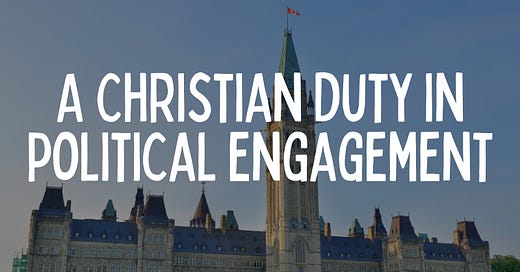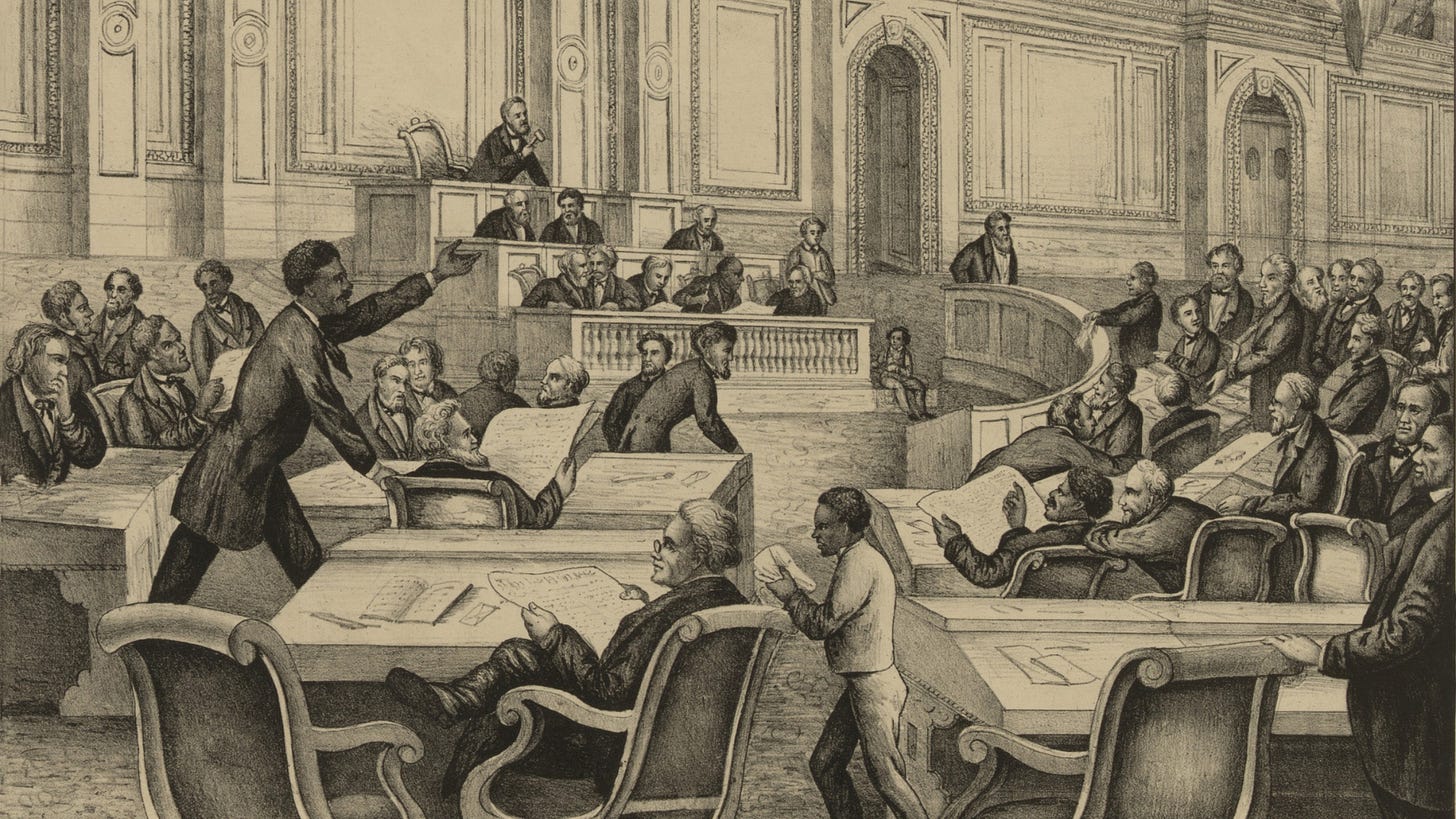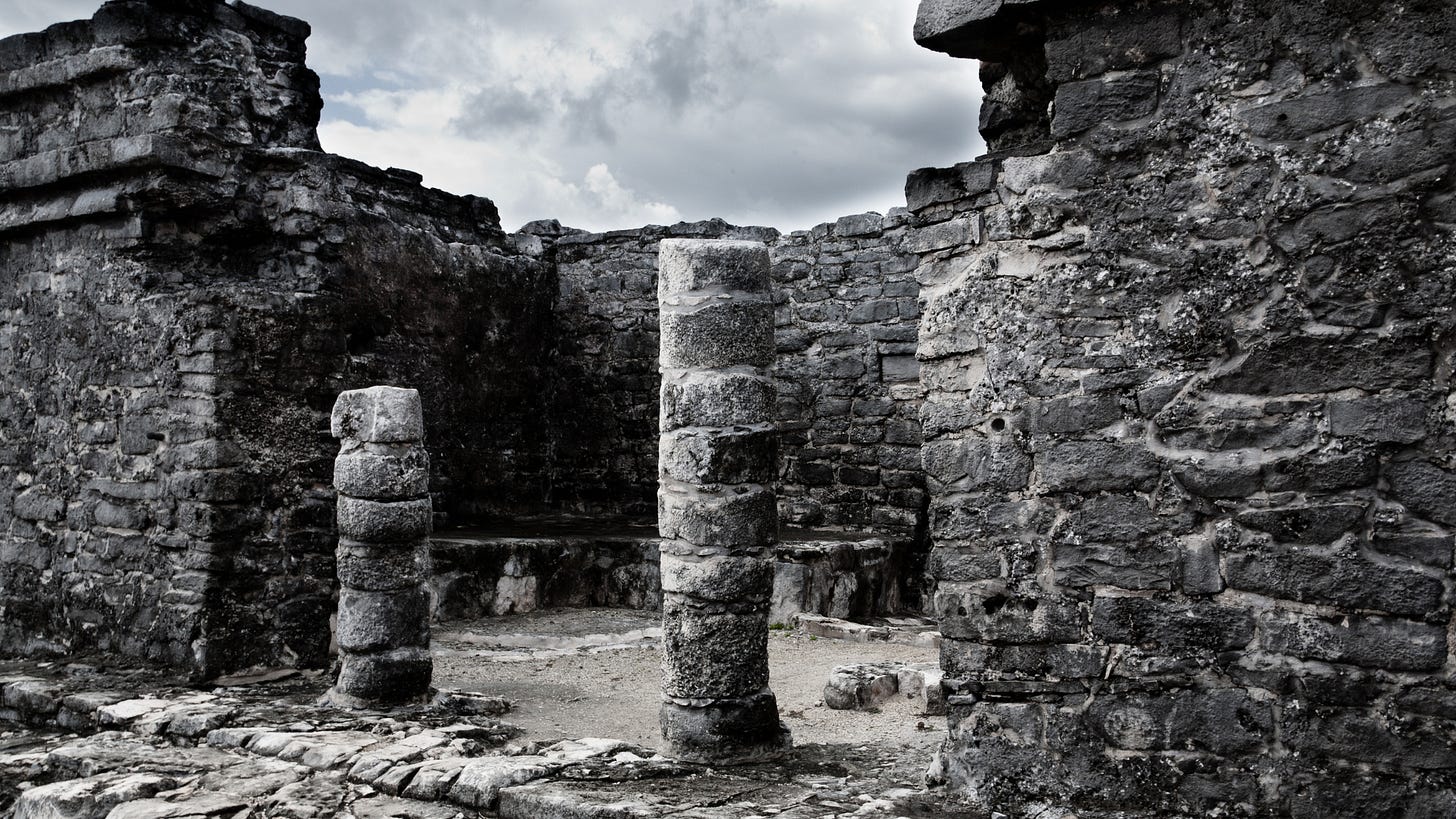NOTE: You can watch the original conference session upon which this article is based HERE
It’s more than elected office
What are politics? Seriously, without Googling it, what comes to your mind when I say politics? I would guess that most people will think of elections, political parties, and making laws. While these are included in a discussion on politics, they are not in themselves politics. The word politics comes from the Greek word “Polis” which means city. A Metropolis is a very important or influential city. A Megalopolis is a highly and densely populated city. Akropolis with a “k” is a really good Greek food distributor in Toronto that is most likely the originator of the spiral spanakopita.
The word politics actually means the art and science of governing people. This has to do with elected officials, or civil magistrates, but politics also involves discussing and debating what morals should dictate our behaviour and laws. Politics involves authourity and influence in a culture. When we properly understand what politics are, we see that Christians are by nature, and must therefore be, political.
Is murder a sin and a crime that should be punished by the State? That’s political. How should we best care for the weak, poor, and vulnerable? That’s politics. Should local churches obey health mandates from the State? That’s politics. The fact is we all live among people who are governed, and we all exist within the context of authority and influence.
The question, then, as it pertains to this article, is should Christians and churches be actively engaged in both the political sphere and in the broader culture, and are they required to do so, as in are they responsible before God for their involvement? Spoiler alert – the answer is yes, and I will endeavour to prove it from the Scriptures.
Blessed to be a blessing
The first part in answering the question I mentioned above is recognizing that we are required to love our neighbours and live for the blessing and welfare of those around us, from our city, to our province, and out to our country. This requirement for God’s people is woven, quite literally, from Genesis to Revelation, and has been well understood throughout Christian history.
When Abram is called by God, he is told that as he obeys the Lord, he will be blessed, and he will be a blessing to those around him (Genesis 12:1-3). Abram is not merely told to tell others about Jesus or else they die and go to hell. He is expected to be a blessing. The Old Testament plays out like this. As God’s people obey Him, they are blessed, and they bless surrounding nations. This blessing looks like, among other things, trade agreements and military help.
When Judah finally enters into Babylonian exile, God through the prophet Jeremiah instructs the people as to godly life in exile. They are not told to merely proclaim the Gospel and save people from hell. In fact, they are told to:
“Build houses and live in them; plant gardens and eat their produce. Take wives and have sons and daughters; take wives for your sons, and give your daughters in marriage, that they may bear sons and daughters; multiply there, and do not decrease. But seek the welfare of the city where I have sent you into exile, and pray to the Lord on its behalf, for in its welfare you will find your welfare.” – Jeremiah 29:5-7
If Jeremiah were around today, he might say something like, “To the oppressed exiles in Canada – a pagan nation – start businesses, engage in social responsibility, get married, have children, and seek the welfare of your city, province, and country.”
Salt and light
In Isaiah 42:5-6 and 49:5-6, the Lord speaks of his chosen servant who will serve as a light to the nations, revealing truth, exposing darkness, and functioning as a beacon to draw men to God. While these passages clearly point to Christ, they don’t only point to Christ. In fact, the Apostle Paul, in Acts 13:46-47, is quoting these passages and begins by saying, “For the Lord has commanded us” (Acts 13:46). God’s elect, His people, His Church – we are a light for the nations.
This is clearly what Jesus is teaching in Matthew 5:14-16 when He says that, “You are the light of the world. A city set on a hill cannot be hidden. Nor do people light a lamp and put it under a basket, but on a stand, and it gives light to all in the house. In the same way, let your light shine before others, so that they may see your good works and give glory to your Father who is in heaven.” Notice that Jesus does not say we should be light, or act like that, but that we are, definitionally and as a part of our very identity, light.
“But Andrew,” some may say, “that’s only about sharing the Gospel.” It isn’t limited to sharing the Gospel, and the context makes that clear. Just look at what Jesus says one verse earlier. “You are the salt of the earth, but if salt has lost its taste, how shall its saltiness be restored? It is no longer good for anything except to be thrown out and trampled under people's feet” (Matthew 5:13). Salt was not used for flavouring steak. It was used as a preservative, to preserve the good meat and work against decay and rotting.
As salt and light, as we proclaim truth and expose darkness everywhere, we preserve what is good (culture, values, ethics, truth) and we push back against evil and decay (oppression, injustice, harm against the vulnerable). Again, we are not told to be light; we are told that we are light, and it is integral to our very identity in Christ that we shine in the darkness and preserve the good as well as expose and push back against evil.
Loving bodies as well as souls
In his book, “Christian Mission in a Modern World,” John Stott summarizes this first point quite well. He writes:
“We are sent into the world to serve, and that the humble service we are to render will include for us as it did for Christ both words and works, a concern for the hunger and for the sickness of both body and soul, in other words, both evangelistic and social activity.
If we truly love our neighbour, we shall without doubt share with him the Good News of Jesus. How can we possibly claim to love him if we know the Gospel but keep it from him? Equally, however, if we truly love our neighbour we shall not stop with evangelism. Our neighbour is neither a bodyless soul that we should love only his soul, nor a soulless body that we should care for its welfare alone, nor even a body-soul isolated from society.
When any community deteriorates, the blame should be attached where it belongs: not to the community which is going bad but to the church which is failing in its responsibility as salt to stop it going bad. And the salt will be effective only if it permeates society, only if Christians learn again the wide diversity of divine callings, and if many penetrate deeply into secular society in order to serve Christ there.”
Old Testament elect politicians
If the first part of the answer to the query about Christian political and cultural engagement is to love our neighbour and seek the welfare of those around us, the second part of the answer lies in the reality that God’s people are required to teach and disciple the State, which at times can include Statecraft politics.
After Joseph is sold into slavery by his brothers, he ends up working for Potiphar in a position of authority (Genesis 39:1-6). Joseph is framed and ends up in prison, where through a series of events he has the opportunity to interpret Pharaoh’s dreams. As he does so, Joseph has the audacity to offer the king both economic and agricultural policy suggestions (Genesis 41:33-36). As a result, Joseph is given the second-highest position in all of Egypt (Genesis 41:37-44). Thus, we have the first instance of one of God’s elect engaging in Statecraft politics. Joseph doesn’t reject the position based on the grounds that God’s people don’t do politics, nor does God rebuke Joseph for engaging. In fact, God blesses it.
Then we have Daniel, who is blessed by God because of his integrity and obedience, and as such, he and his three friends prosper and are regarded as wise by the king (Daniel 1:17-20). Daniel then proceeds to both advise and offer wisdom to a pagan king, while extolling the greatness of God and interpreting the king’s dreams. Like Joseph before him, Daniel is given a high position in political office (Daniel 2:46-48), and again, God is pleased with all of this.
Daniel would interpret yet another one of the king’s dreams, closing off his interpretation with these words: “Therefore, O king, let my counsel be acceptable to you: break off your sins by practicing righteousness, and your iniquities by showing mercy to the oppressed, that there may perhaps be a lengthening of your prosperity” (Daniel 4:27). Here is one of God’s people, in office, calling a pagan king to repent and obey the Lord. (Daniel sure sounds like a Christian Nationalist to me). The end result of this appears to be the salvation of this pagan king.
New Testament prophetic voices
Let’s move on to the New Testament. First, we have John the Baptizer. He rebuked King Herod, a pagan Jew, for marrying his niece. He holds a pagan accountable to God’s Law and commands that the king repent (Matthew 14:1-12). We also have the Apostle Paul, who is twice about to be beaten by Roman authorities because of His commitment to the Gospel (Acts 16:37-38; 22:25-29), and both times Paul declares that he is a Roman citizen, and that it is unlawful for a Roman citizen to be treated this way. John holds the State accountable for personal and moral sins, and Paul holds the State accountable to keep their own laws.
Then we come to Romans 13, which has officially taken over Jeremiah 29:11 and Matthew 7:1 as everyone’s favourite butchered and taken out of context life verse. In Romans 13:1-3, the State is given the responsibility to punish those who break God’s Law and reward those who obey God’s Law. It is worth noting that good and evil in Romans 13 are defined not by the State, nor by the citizenry, but by God. But, who will teach the State what is good and what is evil? Who will show them how they are to serve God? Who will disciple them to know and obey God’s Law?
Peter writes regarding a similar sentiment in 1 Peter 2:13-14. Here again the State is required to punish those who break God’s Law and reward those who obey God’s Law. But who will teach the State these things? That, dear friends, is the sole and unique responsibility of the Church, of individual Christians who engage the State faithfully and boldly. It is the job of people like Joseph and Daniel, who will engage in Statecraft politics. It is the job of John the Baptizer, Paul, and Peter, who will hold the State accountable for both their personal moral lives and how they rule and govern according to God’s Law.
How to navigate this great disaster
Our current political and cultural mess isn’t just because of evil in the world, though that’s a significant part of it. Our present disaster exists because churches have utterly disengaged from politics and culture. Christians have forgotten the examples of Joseph, Daniel, John the Baptizer, Paul, Peter, the Apostles, and Jesus Himself, and they have failed to bring Biblical truth to bear. This includes calling leaders to repent and obey God rightly and calling individual Christians to engage in the cultural and political areas around them.
Here is the crux of the matter – we can no longer refuse to seek the welfare of the city. Consider our present calamity in Canada for a moment. Each year 100,000 pre-born babies are reported to have been murdered, and if we include unreported baby murders, the morning after pill, and the frozen lives snuffed out by IVF, that number is likely much higher. Doctor-assisted murder is the 4th leading cause of death, and it has been growing at an alarming rate year-over-year for the past three years (and it doesn’t seem to be slowing down). The genital mutilation and chemical castration of children is both legislated and paid for by taxpayer dollars. The sexual grooming and sexual perversion of children is protected by the punitive powers given to the State.
In his book The Great Evangelical Disaster,” Francis Schaeffer incisively and presciently wrote the following:
“Here is the great evangelical disaster - the failure of the evangelical world to stand for truth as such. There is only one word for this - namely accommodation: the evangelical church has accommodated to the world spirit of the age. First, there has been accommodation on Scripture, so that many who call themselves evangelicals hold a weakened view of the Bible and no longer affirm the truth of all the Bible teaches - truth not only in religious matters but in the areas of science and history and morality. And the second, there has been accommodation on the issues, with no clear stand being taken even on matters of life and death.
Evangelism is primary, but it is not the end of our work and indeed cannot be separated from the rest of the Christian life. We must acknowledge and then act upon the fact that if Christ is our Saviour, he is also our Lord in all of life. He is our Lord not just in religious things and not just in cultural things such as the arts and music, but in our intellectual lives, and in business, and in our relation to society, and in our attitude toward the moral breakdown of our culture. Acknowledging Christ's Lordship and placing ourselves under what is taught in the whole Bible includes thinking and acting as citizens in relation to our government and its laws.”
So yes, Christians and churches should be actively engaged in both the political sphere and in the broader culture. They are required to do so – they are responsible before God for their involvement. We know this is the case because of both God’s command to love our neighbour and seek the welfare of those around us AND the fact that God’s people are required to teach and disciple the State, which at times can include Statecraft politics.
But what does that look like for each individual believer? It will be different, but before any of those ways are considered, three things must be in place. First, we must be connected to a Biblical and faithful local church for discipleship, accountability, and edification. Second, we must be people who regularly and intentionally engage with the Word of God. Third, we must seek the Lord in prayer and ask His Spirit, who dwells within us, to lead and direct our activities. How about you begin there, and then we can figure out how the Lord would have you engage.








This is a very timely post, for me.
I just had a meeting with a local county commissioner who told me he doesn't think "Christ cares about politics"
Hi Andrew,
Great article. I have organized this one-day conference to address the exact problems you describe in your publications. All the details are here. It would be great if you could make it or just share.
https://letsgobrandonpringle.substack.com/p/dynamite-event-in-edmonton-july-20
you can also email me at redpilled2024@proton.me